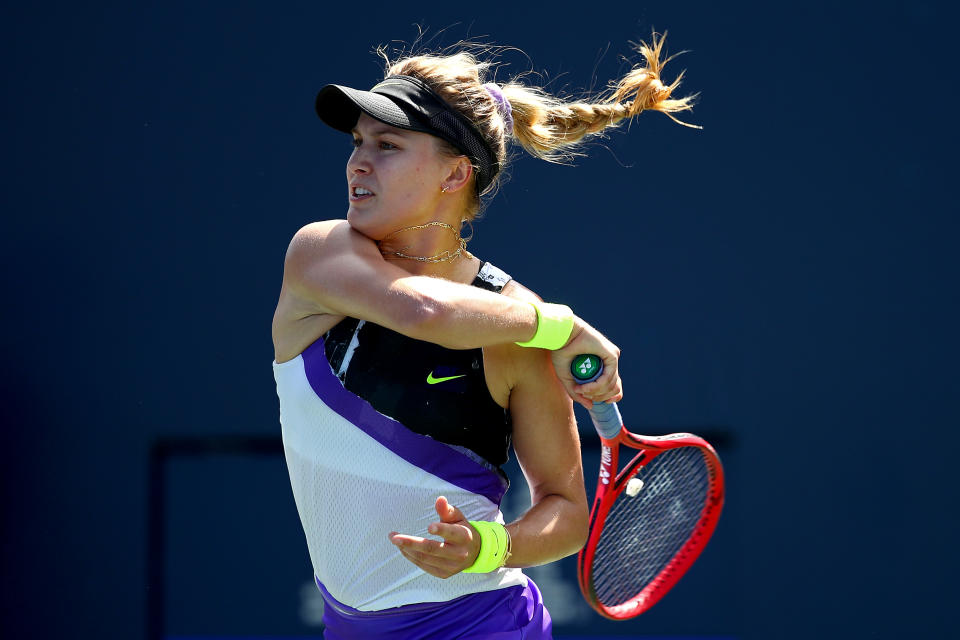US Open: Genie Bouchard's expectations are a matter of perspective

Eugenie Bouchard’s nightmare 2019 just won’t end.
Searching for her first win at the tour level since February, the Canadian succumbed to her 12th-straight defeat, in straight sets, to 12th-seeded Anastasija Sevastova 6-3, 6-3 in the first round of the U.S. Open.
Bouchard took far too long to find a rhythm in this one, losing the first four games of the first set before conjuring up some level of consistency on her groundstrokes. Still, winning three of the next four games left Sevastova serving for the set and she did so successfully to take the opening set.
It’s back to the drawing board for the Canadian and her coach of nearly two months, Jorge Todero, after she went without a coach from April to July. Todero has brought a hard-nosed approach of putting in a lot of practice hours and has also been teaching Bouchard to trust the process, something that she admits to slowly trying to adjust to because she considers herself extremely impatient.
[Join or create a 2019 Yahoo Fantasy Football league for free today]
The public’s patience with Bouchard’s game seems to be wearing thin, too, as she’s now five years removed from the player who followed up an Australian Open and French Open semifinal appearance with a Wimbledon final loss. But this raises the importance of Roger Federer’s comments made at the Cincinnati Masters after being knocked out by Daniil Medvedev, and just how harshly tennis players can be criticized because of individual rankings.
“Sometimes all of a sudden when you achieve your dream it gets a bit rough and you’re being told you’re terrible because you didn’t win so and then, you’re like, ‘OK, you know what, get lost, I don’t care what you say,’ and that’s the truth,” said Federer. “You’ve got to do what you can do best, make yourself proud, your family, your country, whatever it is.
“In tennis, very quickly, take another sport but if you’re the number hundredth best player or athlete or whatever of your sport, you’re a champ. And in tennis we say, ‘Oh, he’s just 100,’ and I disagree with that.”
How does @RogerFederer measure success?
This perspective is something we all need to hear.#CincyTennis pic.twitter.com/vUG3Tsi1v4— Tennis Channel (@TennisChannel) August 14, 2019
Once as high as fifth in the world, Bouchard ranked 119th heading into the final Grand Slam event of the year. The time she’s been putting in outside of matchplay shows some level of desire to get back to a highly competitive professional level, as does the hiring of Todero. The question of “can she?” is an another one entirely.
Perhaps the attention that has so overwhelmingly switched over to Bianca Andreescu (rightfully so) can help her. In some ways, the criticism Bouchard has received for her fall from grace is a reflection of the overall lack of depth and talent in Canadian tennis until the last couple of years. It’s also why — on the men’s side — people are so quick to pounce onto the successes of Denis Shapovalov a couple of years ago and Felix Auger-Aliassime this year while also writing off Milos Raonic as a has-been.
Solving a Rubik’s cube for the first time creates a blueprint for it to be solved over and over again and faster each time. But in sport, the obstacles are ever shapeshifting, the demands constantly changing. And so, the blueprint of today is not the one that necessarily applies tomorrow. No doubt Bouchard has struggled with adjusting accordingly and there’s fair criticism to be had for that, but even recent history shows she’s no exception to the rule.
Jelena Ostapenko won the 2017 French Open and looked as though she announced herself among the many young players looking to take over for Serena Williams as the new face of the women’s game. Instead, she’s had one semifinal and one quarter-final appearance in Grand Slams since and seven occasions where she hasn’t reached the second week including four first-round exits. The Latvian has dropped from fifth on the WTA circuit last year to 77th ahead of her first-round U.S. Open match on Tuesday.
Back in 2011, Andrea Petkovic made a name for herself with quarter-final appearances in each of the four Grand Slams except Wimbledon where she lost in the third round. She soared as high as ninth in the rankings at the age of 24, but then was derailed by a ruptured meniscus in her right knee, twice. Even after a comeback 2014 where she made her first Grand Slam semifinal appearance at the French Open, Petkovic failed to make the second week of a major thereafter and is currently 88th.
There is a reason the sophomore slump has become cliché and reminders constantly surface of the difference between potential and performance. At the end of the day, frankly, some figure it out and others don’t. Regardless of what anyone wants to say about Bouchard’s struggles, there is only one woman in Canada who can play the sport in singles competition at a higher level than her. One. Even for that one, it’s taken five years since Genie’s dream run for there to be a changing of the guard.
People will hate on Bouchard for that very reason, for not being all they hoped she could be and not living up to the expectations that they’ve set for her because they have so few to pin those hopes on, but all she can really do right now, and all she’s ever been able to do, is be the best that she can be.
More sports coverage from Yahoo Sports



